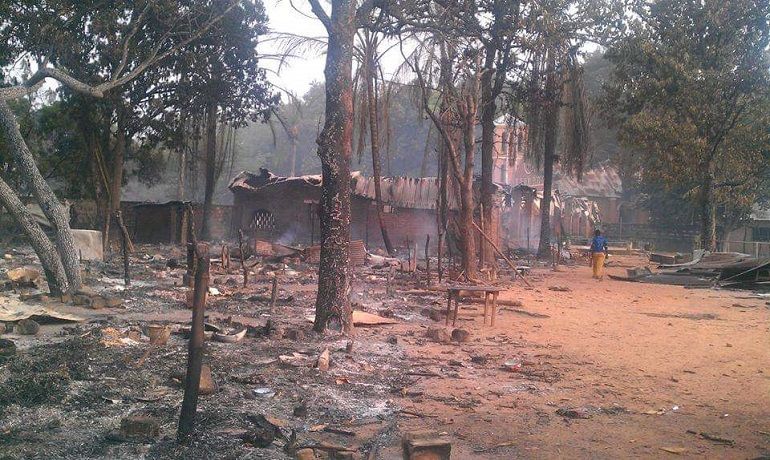
United Nations peacekeepers failed in protecting civilians in the Central African Republic during an attack in November that killed as many as 100 people, among them two priests, according to a report by Amnesty International that was published 14 December.
Multiple eyewitnesses told Amnesty that UN peacekeepers did not stop armed men believed to be members of a Séléka offshoot known by its French acronym UPC (Unité pour la Paix en Centrafrique), a mainly Muslim-Fulani militia, when they stormed the cathedral and the nearby refugee camp in the small town of Alindao, in the south-east of the country.
Instead, the UN troops retreated in an armed vehicle and returned to their central base, witnesses said, leaving thousands of people unprotected in the camp.
“Scores of civilians … were massacred after the UN peacekeepers charged with protecting them failed to take action to fend off their armed attackers,” said Joanne Mariner, Amnesty’s Senior Crisis Response Adviser. Two priests were among those killed in the cathedral.
In May last year, the same town suffered a bloodbath also attributed to UPC militants. According to Amnesty 130 people were massacred, though credible sources estimated the toll reached several hundred. The victims were Christian townspeople and villagers, perceived as supporting armed groups that oppose UPC’s rule.
Amnesty now calls for “an immediate and impartial inquiry” focusing on the actions of the United Nations Multidimensional Integrated Stabilization Mission in the Central African Republic (MINUSCA) and the question whether it failed in its duty to protect.
“The United Nations needs to assess whether the massacre at Alindao was preventable, and, most importantly, what it can do to ensure that future violent attacks on civilians are deterred or contained,” said Joanne Mariner.
In a response to the allegations, MINUSCA told Amnesty that the armed attackers outnumbered the UN troops and they would not have been able to contain the violence.
Amnesty, however, said it spoke with residents in the camp who told them that the MINUSCA deployment consisting of Mauritanian peacekeepers, who had taken over from Burundian troops in May, had not been properly controlling the site which had resulted in arms and armed fighters entering the camp.
According to Amnesty’s report, the Mauritanian troops delegated their daily activities to a small group of Anti-balaka fighters — local self-defence militias that were initially formed in response to violence committed by Séléka and UPC.
‘Civilians are being killed’
Amnesty’s call was echoed by Cardinal Dieudonné Nzapalainga, Archbishop of Bangui. “You [MINUSCA] come in the name of the international community to offer us help, protection and safety,” he said in a radio broadcast earlier this month, according to Agenzia Fides.
“Now here we see that certain forces instead of protecting the people leave them to their plight. Civilians are being killed in Alindao and elsewhere. How else can what we have seen be explained, burned human remains, homes and churches? I ask for an international inquiry to be opened to find the truth of the massacres and let justice be done,” he said.
The archbishop has spoken out repeatedly about the UN peacekeeping deployment for which he and his two fellow leaders of CAR’s interfaith platform initially advocated.
“Rregrettably, we noticed their failures and limitations on the ground,” he said in February. “On various occasions, they have failed to protect those in need of assistance, and many have come to ask questions about their role or mandate in CAR”.
In February, following investigations into its inability to curb violence and allegations of complicity with armed groups in a string of attacks in the country last year, the UN released a report saying that “no evidence was found”.
When UN Secretary-General António Guterres visited the country in October last year, MPs voiced their concerns as reported by World Watch Monitor.
“How to explain that 12,000 men of the United Nations force are on the ground and that at the same time the civilian population continues to be massacred?” asked Karim Meckassoua, the President of the National Assembly. “What is the mandate of this force? Cannot we do better and more?”
On Thursday (12 December) the UN Security Council extended MINUSCA’s mandate while France arrested a former senior leader of Anti-balaka militias in response to charges by the International Criminal Court. Patrice Edouard Ngaissona is accused of crimes against humanity in the Central African Republic between December 2013 and December 2014, according to Human Rights Watch.